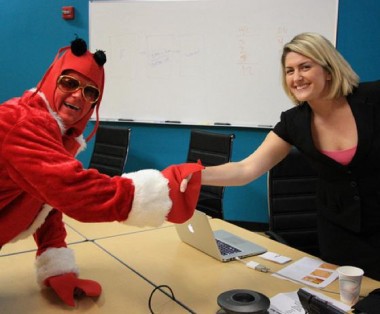Understanding the Difference Between Being Unemployed and Being Unemployable
by Luke Mazur

The worst kind of job interview is over the phone. Who calls whom? Is my phone working? What if a creditor calls at the same moment the interviewer tries? Will the call be bounced? Will the recruiter leave a message? If they don’t call right away, how long should I wait until I call them? Do I even understand how my phone works? Do I even understand how interviews work? Should I shave?
In-person interviews, at least, have rules. Brush your teeth. Don’t swear. But phone interviews? Once, a recruiter called me five minutes before the time we had set the interview. This really rattled me: I hadn’t gone to the bathroom yet, or re-filled my water, so I’d have to do both while talking to her.
But when I answered, she just asked if she could push back the interview until tomorrow. That I was great with, because interviews make me nervous, and why do today what you’re getting permission to do tomorrow? I still haven’t been offered the job. Maybe she just keeps re-scheduling the day she is supposed to call back?
There are still many opportunities with in-person interviews to make it clear you’re unemployable. In law school, a whole bunch of law firms visit school and set up shop in a hotel. The interviews take place in the actual hotel rooms. Career Services advised us not to make jokes about the beds in the room. We used to joke that we were cheap tricks for the law firms to use, but then none of them hired me and this joke didn’t land right anymore. I think others continued to make the joke, and if law firms are visiting the hotel this year, probably more students are thinking of the same joke for the very first time. It’s fairly low hanging fruit.
I worked for the Census earlier this year. They didn’t interview, but they still called. Applicants who scored high enough on the test got called to work. They’d ask if you were available before they offered you the job, but that was the only question they asked. And even that seemed redundant, because if you took the Census test, you probably needed a job. Carl Paladino can complain about government inefficiency all he wants, but the query was functional.
This summer I got a phone call from my area code. I vaguely recognized the number, but it wasn’t in my phone book, so I knew it wasn’t family, or a pizzeria, or a friend, or even someone who used to be a friend. I answered though, because maybe it was someone offering me a job, or more likely I thought, interviewing me for one. It ended up being the local director of the Census, calling to yell at me. A few weeks earlier, I had tweeted that people should message me if they were interested in [redacted] Census [redacted]. I added that I wouldn’t ask twice whether they were Latina.
I told the Director that I was joking. I was! But I still deleted the tweet. I texted my lawyer friends to ask if I was in trouble, and they didn’t know, but they assured me that he was probably just scaring me into deleting the tweet. I told them that I remembered we weren’t supposed to [redacted] Census [redacted], and they reminded me that I didn’t [redacted] anything. I only kind of joked about [redacted].
Even still, that the Director found the tweet at all worried me. Was I going to prison over this? What other tweets did he read? What other things did I tweet? I signed up to work the Census, to be a member of the largest corps of civilian workers assembled since World War II, because I needed some extra money. Not to commit a crime. I didn’t even work that many hours. I mostly just ran errands for some of the managers. I was a team player.
This all occurred at the same time that Gary Shteyngart’s new novel Super Sad True Love Story hit, and though I didn’t read the book, I recall whining existentially about that book’s premise to my friend, also a lawyer: if the government takes away satire, what will I have? If an employer doesn’t like my tweets, I continued, I don’t want to work for them anyhow.
Except.
I wondered: was cracking wise via Twitter doing me in with potential employers too? If my Census boss was looking at my Twitter, wouldn’t they all be doing the same? And if so, was it the cracking wise itself? Or was it that the cracking wasn’t all that wise?
My friend had a diagnosis: “You’re being stupid.”
And that’s true. All this worrying and self-reflection and joking and messing about online cost me, at the very least, one day of applying to jobs. And that’s only the cost I know about. What’s more, I was wasting time, and worse, I was tweeting about wasting time. And then I was asking too many questions about those tweets. Which is to say, when it comes to job interviews, focus on the job. Let them worry about the interview.
Sponsored posts are purely editorial content that we are pleased to have presented by a participating sponsor, in this case Gillette; advertisers do not produce the content.
Luke Mazur is a resident of Buffalo, N.Y. — and a beer-related social networking entrepreneur!
Photo by Ted Murphy from Flickr.
